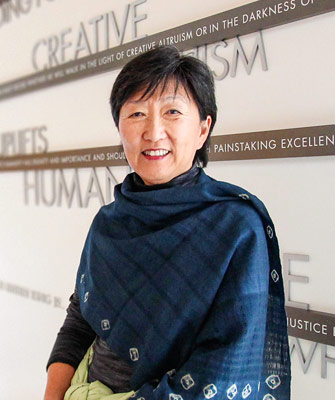 Angela Oh, KRC Board Member
Angela Oh, KRC Board Member
Angela Oh is an attorney, teacher, and public lecturer best known for her role as spokesperson for the Korean American community after the 1992 Los Angeles Riots and her position on President Bill Clinton’s One America Initiative.
I am a native Angeleno, and a second generation Korean American. I was born and raised in the Crenshaw/Exposition neighborhood where my grandmother had a small apartment at the back of another apartment building mostly occupied by foreign students at U.S.C. At the time, the neighborhood was mostly African American, not filled with students from all walks of life, as it is today. Koreatown has changed a lot.
In 1992, I had the experience of living through what is known as the uprising, the unrest, the riots, the Rodney King beating. It was a very chaotic, painful, and destructive time in Koreatown. Even back then, the town wasn’t mostly Korean American by population. It was a mix of people from Latin America, Mexico, Korea, and local families who occupied the big, old homes that still stand in the Country Club subdivision in that part of town. A lot of the real estate and assets were Korean-owned so Koreatown was the identity - shops, markets, auto body repair, wig shops, hat shops, nothing like what we see today. Today’s Koreatown now has it’s own moniker - “K-town” - and everyone knows the best kalbi house, the coolest coffee hangout, and Soomi Soomi — ice milk treats with sweet red bean or custard inside. A different and very precious new community.
Today, Koreatown is being asked to step-up to help with the housing crisis in the City of Los Angeles. We are blessed and cursed. The City is one of the most expensive places to live and the problem of people without housing is enormous — in size and complexity. The good people of Los Angeles passed local bond measures to make millions of dollars available to alleviate the problem — and the solutions have to start where the city has its assets. One of the places is K-town.
The attack on our local government leaders is not fair. They have a few other items on their plate these days, beyond the housing crisis. Their offices reached out to various groups to discuss the problem as far back as a year ago and perhaps because it was a delicate problem - the conversations got heard in very different ways. So much so that some who were participating from the Korean American community didn’t even realize that the discussions were leading to a proposed place to provide housing for the poor in Koreatown proper. This has caused a huge uproar within K-town circles. Talk of crime, mentally ill, and violence has led to a very predictable reaction: fear, suspicion, and defiance for not being “consulted” as a community. Except: there were consultations and discussions. Perhaps people heard and understood very different things to bring us to this moment: conflict in the community, confusion about what will actually be established as a resource for those without homes, uncertainty about whether resources will be available to support the transition for those who need a place to sleep and be safe.
It seems that words fail us sometimes. Words like “homeless” too easily lead to words like “drugs”, “safety risk”, and “violence” — but the problem is this: we are faced with a huge and complicated challenge in Los Angeles. We need the entire city, including our K-town, to step up and do as much as possible — until it hurts - to help. Families, children, disabled veterans, and immigrants need help. Koreatown has space owned by the city. The community needs to support the city with offers of help in social services, in health care, in mental health services. The City needs to support the resources in Koreatown by offering funding and other resources to allow this crisis to be an opportunity for demonstrating that we truly do live in the City of Angels.
# # #
